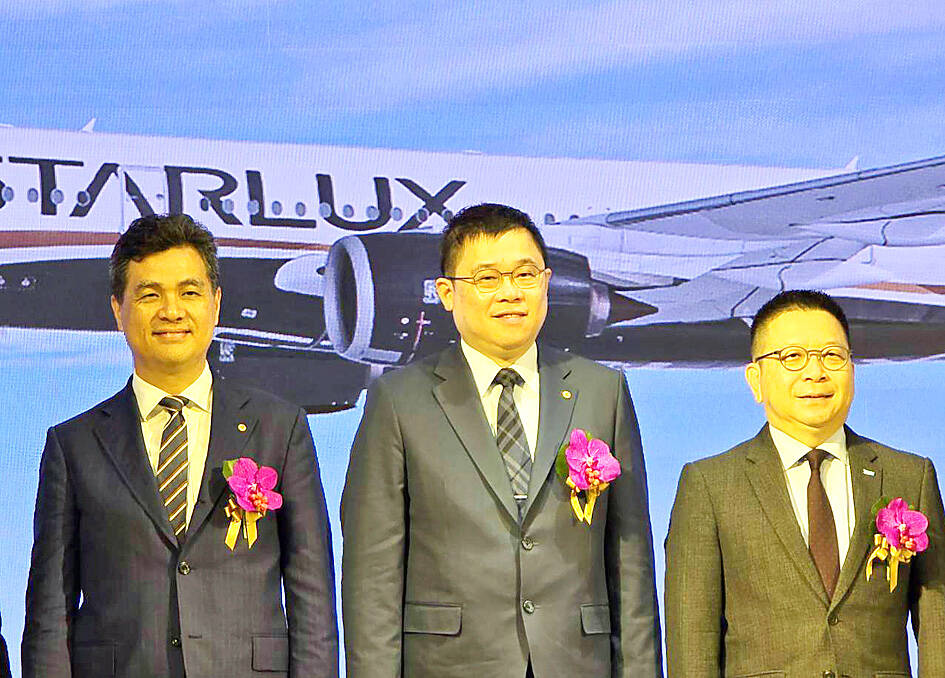Shares of Starlux Airlines Co (星宇航空) surged more than 53 percent on its debut on the Taiwan stock exchange yesterday.
Starlux shares closed up 53.75 percent at NT$30.75 from its initial public offering price of NT$20 after retreating in late trading from a 60 percent rise.
China Airlines Ltd (CAL, 中華航空) rose 0.90 percent to close at NT$22.35, while EVA Airways Corp (長榮航空) gained 0.40 percent to close at NT$37.70.

Photo: CNA
In Taiwan, a newly listed stock is allowed to go beyond the 10 percent maximum increase or decline in its first five trading sessions.
At the listing ceremony, Starlux chairman Chang Kuo-wei (張國煒) said the carrier has entered its second phase of expansion since last month, setting its sights on destinations in Europe.
Starlux is planning to add three destinations next year, covering long-haul and short-haul routes, Chang said.
The airline was looking to increase flights to Los Angeles and Seattle, and had also set its sights on other US destinations such as New York, Dallas and Houston, he said last month.
The carrier is expected to be operating 31 routes to 27 destinations worldwide by the end of this year.
Starlux has a fleet of 24 aircraft, which would increase to 26 after the carrier takes delivery of two A350-900s before the end of this year.
Chang said that the fleet is expected grow to more than 50 planes by 2026, focusing on aircraft geared for the long-haul market.
The next step would be to add more flights out of Taichung and Kaohsiung, he said, adding that the firm would likely add A320 aircraft, boosting the fleet to more than 70, to meet those needs.
Starlux was upbeat about the transit market through Taiwan for passenger and cargo business, he said, highlighting anticipated growth in demand for cargo services to destinations in Southeast Asia and the US.
The company is keen to enter the cargo business and early this year signed an agreement to buy five A350 cargo planes with an option for an additional five, he said.
Starlux was profitable for the first time last year, posting net profit of NT$149 million (US$4.65 million), or earnings per share (EPS) of NT$0.08.
In this first half of this year, its EPS was NT$0.39, up from NT$0.18 in the same period last year.
The airline reported consolidated sales of NT$9.60 billion last quarter, up 58 percent from a year earlier and the highest for any quarter in the company’s history.
To broaden its international reach, Starlux has said it would apply to join the Oneworld global airline alliance before the end of next year.
The Oneworld Alliance has 13 members, including American Airlines, British Airways, Cathay Pacific and Qantas.
It serves more than 900 destinations in 170 territories.

TAKING STOCK: A Taiwanese cookware firm in Vietnam urged customers to assess inventory or place orders early so shipments can reach the US while tariffs are paused Taiwanese businesses in Vietnam are exploring alternatives after the White House imposed a 46 percent import duty on Vietnamese goods, following US President Donald Trump’s announcement of “reciprocal” tariffs on the US’ trading partners. Lo Shih-liang (羅世良), chairman of Brico Industry Co (裕茂工業), a Taiwanese company that manufactures cast iron cookware and stove components in Vietnam, said that more than 40 percent of his business was tied to the US market, describing the constant US policy shifts as an emotional roller coaster. “I work during the day and stay up all night watching the news. I’ve been following US news until 3am

Six years ago, LVMH’s billionaire CEO Bernard Arnault and US President Donald Trump cut the blue ribbon on a factory in rural Texas that would make designer handbags for Louis Vuitton, one of the world’s best-known luxury brands. However, since the high-profile opening, the factory has faced a host of problems limiting production, 11 former Louis Vuitton employees said. The site has consistently ranked among the worst-performing for Louis Vuitton globally, “significantly” underperforming other facilities, said three former Louis Vuitton workers and a senior industry source, who cited internal rankings shared with staff. The plant’s problems — which have not

TARIFF CONCERNS: The chipmaker cited global uncertainty from US tariffs and a weakening economic outlook, but said its Singapore expansion remains on track Vanguard International Semiconductor Corp (世界先進), a foundry service provider specializing in producing power management and display driver chips, yesterday withdrew its full-year revenue projection of moderate growth for this year, as escalating US tariff tensions raised uncertainty and concern about a potential economic recession. The Hsinchu-based chipmaker in February said revenues this year would grow mildly from last year based on improving supply chain inventory levels and market demand. At the time, it also anticipated gradual quarter revenue growth. However, the US’ sweeping tariff policy has upended the industry’s supply chains and weakened economic prospects for the world economy, it said. “Now

COLLABORATION: Given Taiwan’s key position in global supply chains, the US firm is discussing strategies with local partners and clients to deal with global uncertainties Advanced Micro Devices Inc (AMD) yesterday said it is meeting with local ecosystem partners, including Taiwan Semiconductor Manufacturing Co (TSMC, 台積電), to discuss strategies, including long-term manufacturing, to navigate uncertainties such as US tariffs, as Taiwan occupies an important position in global supply chains. AMD chief executive officer Lisa Su (蘇姿丰) told reporters that Taiwan is an important part of the chip designer’s ecosystem and she is discussing with partners and customers in Taiwan to forge strong collaborations on different areas during this critical period. AMD has just become the first artificial-intelligence (AI) server chip customer of TSMC to utilize its advanced